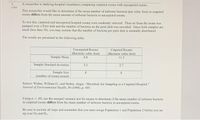
MATLAB: An Introduction with Applications
6th Edition
ISBN: 9781119256830
Author: Amos Gilat
Publisher: John Wiley & Sons Inc
expand_more
expand_more
format_list_bulleted
Question
See photo for question

Transcribed Image Text:A researcher is studying hospital cleanliness comparing carpeted rooms with uncarpeted rooms.
1.
(12pt)
This researcher would like to determine if the mean number of airborne bacteria (per cubic foot) in carpeted
rooms differs from the mean amount of airborne bacteria in uncarpeted rooms.
To test this, carpeted and uncarpeted hospital rooms were randomly selected. Then air from the room was
pumped over a Petri dish and the number of bacteria on the petri dish was recorded. Since both samples are
small (less than 30), you may assume that the number of bacteria per petri dish is normally distributed.
The results are presented in the following table:
Uncarpeted Rooms
(Bacteria/ cubic foot).
9.8
Carpeted Rooms
(Bacteria/ cubic foot)
11.2
Sample Mean
Sample Standard deviation
3.2
2.7
Sample Size
8
8
(number of rooms tested)
Source: Walter, William G., and Stober, Angie, "Microbial Air Sampling in a Carpeted Hospital."
Journal of Environmental Health, 30 (1968), p. 405.
Using a = .05, use the unequal variance test for means to determine if the mean number of airbome bacteria
in carpeted rooms differs from the mean number of airborne bacteria in uncarpeted rooms.
Be sure to include all steps and remember that you must assign Population 1 and Population 2 before you set
up your Ho and H.
Expert Solution
This question has been solved!
Explore an expertly crafted, step-by-step solution for a thorough understanding of key concepts.
This is a popular solution
Trending nowThis is a popular solution!
Step by stepSolved in 2 steps with 2 images

Knowledge Booster
Similar questions
- See picture for question.arrow_forwardI can not tell which question is marked correct.arrow_forward3. A skydiver started his jump from the airplane. He fell 4.9 m in the 1st second, 14.7 m in the 2nd second, 24,5 m in the 3rd second. How far did he fall between the 7th and the 10th seconds?arrow_forward
arrow_back_ios
arrow_forward_ios
Recommended textbooks for you
 MATLAB: An Introduction with ApplicationsStatisticsISBN:9781119256830Author:Amos GilatPublisher:John Wiley & Sons Inc
MATLAB: An Introduction with ApplicationsStatisticsISBN:9781119256830Author:Amos GilatPublisher:John Wiley & Sons Inc Probability and Statistics for Engineering and th...StatisticsISBN:9781305251809Author:Jay L. DevorePublisher:Cengage Learning
Probability and Statistics for Engineering and th...StatisticsISBN:9781305251809Author:Jay L. DevorePublisher:Cengage Learning Statistics for The Behavioral Sciences (MindTap C...StatisticsISBN:9781305504912Author:Frederick J Gravetter, Larry B. WallnauPublisher:Cengage Learning
Statistics for The Behavioral Sciences (MindTap C...StatisticsISBN:9781305504912Author:Frederick J Gravetter, Larry B. WallnauPublisher:Cengage Learning Elementary Statistics: Picturing the World (7th E...StatisticsISBN:9780134683416Author:Ron Larson, Betsy FarberPublisher:PEARSON
Elementary Statistics: Picturing the World (7th E...StatisticsISBN:9780134683416Author:Ron Larson, Betsy FarberPublisher:PEARSON The Basic Practice of StatisticsStatisticsISBN:9781319042578Author:David S. Moore, William I. Notz, Michael A. FlignerPublisher:W. H. Freeman
The Basic Practice of StatisticsStatisticsISBN:9781319042578Author:David S. Moore, William I. Notz, Michael A. FlignerPublisher:W. H. Freeman Introduction to the Practice of StatisticsStatisticsISBN:9781319013387Author:David S. Moore, George P. McCabe, Bruce A. CraigPublisher:W. H. Freeman
Introduction to the Practice of StatisticsStatisticsISBN:9781319013387Author:David S. Moore, George P. McCabe, Bruce A. CraigPublisher:W. H. Freeman

MATLAB: An Introduction with Applications
Statistics
ISBN:9781119256830
Author:Amos Gilat
Publisher:John Wiley & Sons Inc

Probability and Statistics for Engineering and th...
Statistics
ISBN:9781305251809
Author:Jay L. Devore
Publisher:Cengage Learning

Statistics for The Behavioral Sciences (MindTap C...
Statistics
ISBN:9781305504912
Author:Frederick J Gravetter, Larry B. Wallnau
Publisher:Cengage Learning

Elementary Statistics: Picturing the World (7th E...
Statistics
ISBN:9780134683416
Author:Ron Larson, Betsy Farber
Publisher:PEARSON

The Basic Practice of Statistics
Statistics
ISBN:9781319042578
Author:David S. Moore, William I. Notz, Michael A. Fligner
Publisher:W. H. Freeman

Introduction to the Practice of Statistics
Statistics
ISBN:9781319013387
Author:David S. Moore, George P. McCabe, Bruce A. Craig
Publisher:W. H. Freeman